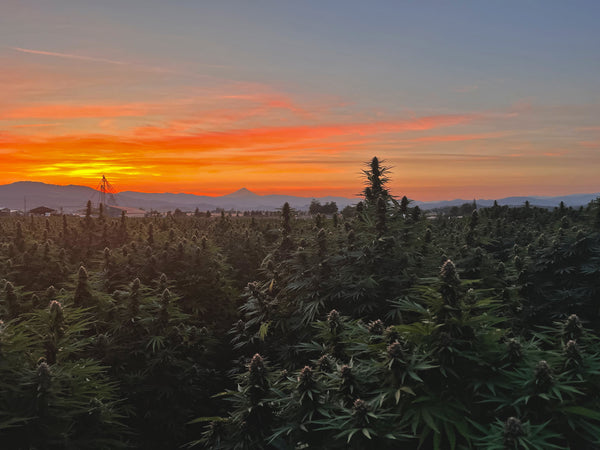
2018 House Farm Bill Update
The 2014 Farm Bill (House of Representatives bill H.R. 2642) applied revisions to previous legislation designed to support farmers and promote agriculture research, marketing, and promotion. One of the crops under research was hemp. The 2018 Farm Bill revised this bill and profoundly affected the hemp industry.
The revised 2018 Farm Bill and its first extension have expired. If you are wondering how this could affect the pure CBD flower you love, then this is the article for you.
What is the Farm Bill?
A farm bill is a piece of legislation enacted by the federal government to support farmers, agriculture, and food security in the United States. This began with the first farm bill from the US House and Senate, the Agricultural Adjustment Act of 1933. There have been many amendments, including the Agricultural Adjustment Act of 1938 and the Agricultural Act of 1949.
The Act of 1938 made it mandatory for the government to support prices and the production of some commodities. The 1949 Act added nonbasic commodities to the mandatory support list, including tung nuts and mohair. Some provisions became permanent law.
The 2014 bill and the updated 2018 farm bill suspend permanent law. This has been part of the farm bill process for decades, and permanent law remains inactive for the duration of the farm bill.
What is the Length of the Farm Bill?
House and Senate committees typically propose farm bills that last for five years. At the end of this time the bill either expires, gets an extension, or is replaced by a new farm bill.
The 2018 Farm Bill was extended on December 26th, 2024 for another year and remains in effect until September 30th, 2025.
What Are Some Things the Farm Bill Covers?
Previous farm bills have covered a variety of activities that are important to agriculture, food production, and food security, like the 1977 Farm Bill (House Bill H.R. 2649) that created the Supplemental Nutrition Assistance Program (SNAP) for low-income families.
Amendments and updates in the 2018 Farm Bill support previous programs like SNAP, and more. Support from the farm bill is what many people in rural communities depend on for infrastructure development and maintenance. Other provisions in farm bills include the following:
- Risk management and lending programs.
- Soil and habitat conservation programs.
- Financing for research, education, marketing, and promotions.
- A payment system to farmers to limit the production of some commodities to help stabilize the market.
- Food assistance for low-income families, schools, and communities.
These programs and more have been part of farm bills for years, and many farms depend on one or more of these provisions for support.
What Do Farm Bills Do For CBD Users?
The 2014 Farm Bill (House Bill H.R. 2642) helped to create the hemp CBD flower market we know today.
The Agricultural Act of 2014, or the 2014 Farm Bill, fostered hemp production by defining industrial hemp as cannabis with 0.3% or less of delta 9 THC and authorizing hemp pilot programs. These programs, conducted by approved institutions, allowed entrepreneurs to explore potential uses of hemp and hemp products, including food, textiles, CBD, and supplements. The act encouraged states to legalize hemp and develop regulatory structures.
Updates in the 2018 Farm Bill were even more significant for hemp growers.
What Did The 2018 Farm Bill Do For Growers?
The 2018 Farm Bill (House Bill H.R. 2) is exactly what hemp farmers needed for full-scale hemp production, allowing farms that had been growing hemp for research to expand and begin selling to the public. The bill removed any hint of illegality around hemp by doing three important things.
- It replaced the term “industrial hemp” with “hemp.”
- It differentiated between marijuana and hemp.
- It carved out an exception for the 0.3% (or less) delta 9 THC content in hemp.
These changes removed hemp from the Controlled Substances Act.

The 2018 Farm Bill made it legal to farm hemp and enabled Rogue Origin and other companies to market and sell their crop on the open market. Today the hemp flower and preroll market is estimated to be worth around $1.63 billion a year to the US economy.
What if the Senate and House Don’t Pass a Farm Bill?
The 2018 Farm Bill has expired, and so has its 1-year extension. What happens now is unclear. Congress may pass emergency funding for provisions in the bill, enact another extension to the updated 2018 Farm Bill, pass a new bill, or let the bill run out and revert to permanent law.
What Will Happen to Prices under Permanent Law?
If you’re wondering what the farm bill is doing for prices, consider what might happen to dairy products under permanent law. The federal government would be compelled to purchase commodities like milk at prices set in the benchmark period of 1910-1914. This could double consumer prices for dairy products and other commodities covered by the bill.
How Could Hemp Growers be Affected?
If a new Farm Bill is not approved, the changes to terminology made in the 2018 Farm Bill may remain and hemp should stay legal.
Hemp is not a commodity in the Senate or House farm bills, so it won’t be subjected to price increases caused by mandatory federal purchasing called for by permanent law.
If a hemp farm depends on projects that lack permanent authorization, those projects may be ended. This may make some farms more expensive to operate, reduce the number of jobs, raise hemp prices, and lower farm profits.
Rogue Origin Farms
It’s safe to say that regardless of what the next house farm bill is, what provisions an updated 2018 Farm Bill may contain, or when it is enacted (or not), Rogue Origin will continue to farm hemp as long as it is legal.
Try our CBD flower and prerolls today, and tell us how we’re doing. You can purchase our cultivars by the ounce, the pound, or wholesale for the best price, and you always get free shipping on orders of $75 or more. Order one or more flavors of tasty hemp today!







